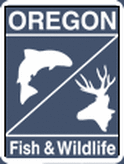
Cormorant hazing aims to protect young fish
http://www.dfw.state.or.us/news/2015/
March 31, 2015
The double-crested cormorant is a waterbird associated with inland waterways as well as on the coast. They catch fish by swimming and diving, and nest in trees, cliffs and on the ground on predator-free islands. Cormorants are protected by international treaty and federal law.
Download high resolution image.
TILLAMOOK, Ore. – Hazing of double-crested cormorants is set to begin soon in several areas along the Oregon Coast to improve survival of juvenile salmon and steelhead.
Double-crested cormorants are goose-sized, fish-eating waterbirds that occur throughout Oregon, and are particularly prevalent in the state’s estuaries during April through September. Research indicates cormorants may eat significant numbers of juvenile salmon and steelhead that migrate to the ocean during this time.
To reduce threat to young fish, the Oregon Department of Fish and Wildlife is working with several nonprofit and local governmental organizations to haze cormorants in six coastal estuaries over the next two to four months.
Hazing will involve driving at the birds in small boats and, in some estuaries, firing at them with small pyrotechnics. Hazing workers are being provided by the Clatsop County Fisheries Project, Port of Nehalem, Port of Bandon, North Coast Salmon and Steelhead Enhancement Fund, and Alsea Sportsmen’s Association. ODFW will provide a portion of the funding and program oversight, and will conduct some hazing operations itself to protect hatchery releases on Young’s Bay on the Columbia River.
Hazing will take place as early as April 1 and continue through May 31 in the Nehalem, Nestucca, and Coquille river estuaries and in Tillamook and Alsea bays. The program will continue through July 31 in Astoria, where the Clatsop County Fisheries Project manages a salmon rearing program.
Hazing is designed to disrupt the birds’ feeding patterns long enough to give wild-spawned and hatchery fish a chance to pass through the estuaries unharmed. Some of these spring migrants are listed by the state or federal government as species under some degree of conservation risk, including coho salmon, which are federally Threatened in Oregon under the Endangered Species Act. Cormorant hazing is expected to benefit both wild-spawned and hatchery fish.
In a separate but related project, ODFW staff will collect up to 50 double-crested cormorants at the mouth of the Umpqua River. This is part of an ongoing study that will assess the diet of double-crested cormorants in Oregon estuaries. Oregon has a permit from the U.S. Fish and Wildlife Service that allows for limited collection of double-crested cormorants, a protected species under the federal Migratory Bird Treaty Act.
ODFW is also actively researching the potential use of low-power handheld lasers to disperse cormorants from feeding and roosting sites. Laser-based hazing activities will occur this spring on a trial basis at several coastal locations.
###
Contact:
James Lawonn, (503) 842-2741, Ext. 251 / 503-812-8171
Lindsay Adrean, 503-947-6099
USFWS ~ Email Exposes ODFW Lie About the Winter Lake Restoration Project
Fred Messerle Bankrupting Beaver Slough Drainage District to Harass Neighbor
ODFW ~ Permit for the Winter Lake/China Creek Project, Messerle Named Manager
ODFW ~ Purchases Private Property for Wetland Restoration "Mosquito Preserve"
ODFW ~ Commission to Consider Land Grab in Willamette Valley December 5, 2014
#ODFW~ Public Meetings in October for 2015 Groundfish & Sport Halibut Seasons
#ODFW to host public meetings on commercial nearshore fishery September
OFF~Lead Ammo Ban Update #ODFW Skirting Extreme Environmental Agenda
#ODFW Director Elicker takes Leadership Position with #USFWS =Government Graft
#ODFW~Popular Charleston boat ramp re-opens for fall salmon angling Sept. 2, 2014
Wrangling Over Water~The Story of the Johnson Creek Damn in #CoosCounty
ODFW---Fish and Wildlife Commission sends ODFW budget to Governor, Too Much
Weyerhaeuser Offers Company Forestland for Recreational Access
ODFW---Letter to Hunters on an All-Out Ban on Lead Ammo-Public Comment Needed
OFF---Ban on Lead Ammo Is on the Horizon
ODFW--- Adopt the Coastal Multi-Species Conservation and Management plan

 RSS Feed
RSS Feed
